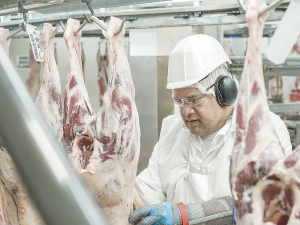Farmer confidence dips slightly, but positivity still dominates
Farmer confidence has taken a slight dip according to the final Rabobank rural confidence survey for the year.
 China remains our top market with 50% of total lamb exports, but the value of shipments has plunged 25% year-on-year.
China remains our top market with 50% of total lamb exports, but the value of shipments has plunged 25% year-on-year.
'El Nino has officially arrived.’
That’s how Rabobank’s October agribusiness report begins, on the back of NIWA’s weather reports for September.
This has seen RaboResearch lower its milk production forecast from the big seven milk export regions to a mere 0.4% growth in output. However, it also sees a possible whiplash in milk prices growing as demand resurgence potentially outstrips milk output, leading to a shortage of milk and providing a bullish run into 2024.
Following beef prices tracking upwards in August after slipping in July, the banks says the North Island bull price is tracking for a slight lift above the five year average by the end of the month. In the US, higher domestic lean beef pricings as well as lower inventory are anticipated to provide positive support for imported NZ product over the coming weeks. While YOY shipments to China fell by 40%, this is mostly offset by much higher export volumes (+118%) and values (+80%) to the US.
Lamb prices generally follow on from August; that is to say, historically low but stable. While China remains our top market with 50% of total lamb exports, the value of shipments has plunged 25% year-on-year. However, demand from other markets is stronger than this point last year, with exports to the UK and US higher yearon- year for volume and value. On the other hand, Rabobank sees some indications showing that volumes may be starting to move again in the Chinese market.
The report says the bank’s prediction that August’s surge in fertiliser prices was only a temporary price correction has been borne out by the drop in Middle East reference for urea dropping 2.5% and Canadian potash steadying. Meanwhile, it says Chinese price of herbicides, fungicides and insecticides have dropped 30% YOY, and next season is likely to have a better cost structure for agrichemicals and fertilisers.
Rabobank says with Q2 growth exceeding expectations and a revised result for Q1 bringing it out of the negative, combined with a weak currency and rising global energy prices, make a much greater likelihood of a rise in the official cash rate in the near future.
According to the latest Fresh Produce Trend Report from United Fresh, 2026 will be a year where fruit and vegetables are shaped by cost pressures, rapid digital adoption, and a renewed focus on wellbeing at home.
The Roar is a highlight of the game hunting calendar in New Zealand, with thousands of hunters set to head for the hills to hunt male stags during March and April.
OPINION: The past few weeks have been tough on farms across the North Island: floods and storms have caused damage and disruption to families and businesses.
European dairy giant Arla Foods celebrated its 25th anniversary as a cross-border, farmer-owned co-operative with a solid half-year result.
The sale of Fonterra’s global consumer and related businesses is expected to be completed within two months.
Fonterra is boosting its butter production capacity to meet growing demand.

OPINION: Meanwhile, red blooded Northland politician Matua Shane Jones has provided one of the most telling quotes of the year…
OPINION: This old mutt has been around for a few years now and it seems these ‘once in 100-year’ weather…